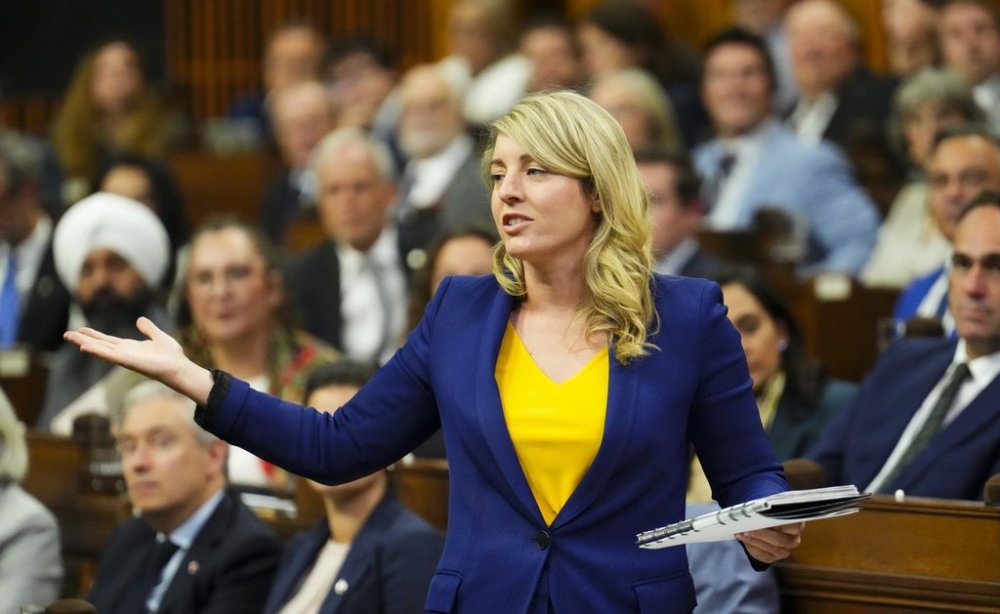‘Stable’ reputation makes Canada attractive to investors, Joly says
Advertisement
Read this article for free:
or
Already have an account? Log in here »
To continue reading, please subscribe:
Monthly Digital Subscription
$1 per week for 24 weeks*
- Enjoy unlimited reading on winnipegfreepress.com
- Read the E-Edition, our digital replica newspaper
- Access News Break, our award-winning app
- Play interactive puzzles
*Billed as $4.00 plus GST every four weeks. After 24 weeks, price increases to the regular rate of $19.00 plus GST every four weeks. Offer available to new and qualified returning subscribers only. Cancel any time.
Monthly Digital Subscription
$4.75/week*
- Enjoy unlimited reading on winnipegfreepress.com
- Read the E-Edition, our digital replica newspaper
- Access News Break, our award-winning app
- Play interactive puzzles
*Billed as $19 plus GST every four weeks. Cancel any time.
To continue reading, please subscribe:
Add Free Press access to your Brandon Sun subscription for only an additional
$1 for the first 4 weeks*
*Your next subscription payment will increase by $1.00 and you will be charged $16.99 plus GST for four weeks. After four weeks, your payment will increase to $23.99 plus GST every four weeks.
Read unlimited articles for free today:
or
Already have an account? Log in here »
Ottawa’s industrial strategy will leverage Canada’s reputation for stability to attract more foreign investment, Industry Minister Mélanie Joly said on Thursday in a speech at the Canadian Club of Toronto.
Joly used the event to lay out the federal government’s plan to protect and build up key sectors in Canada, as U.S. President Donald Trump’s tariff campaign has disrupted global trade flows.
Joly said Canada’s reputation for good governance makes it attractive to investors who are looking for “a stable environment with no surprises.”

“We can offer that,” she said.
Canada will work on reducing red tape and speeding up approval timelines to improve the business case for foreign firms looking for places to invest for the long term, she added.
Joly was in Washington with Prime Minister Mark Carney to meet with U.S. President Donald Trump’s administration earlier this week, but Canadian officials have yet to secure a deal to end ongoing sectoral tariffs affecting Canada.
The federal government is focused on protecting industries still struck by American tariffs: steel, aluminum, autos, copper and lumber.
In the near term, Ottawa will continue to support affected companies through its $5 billion large enterprise tariff loan facility. Algoma Steel last week received a $400-million loan from the federal government to help the Sault Ste. Marie, Ont.-based firm pivot its business model away from the U.S. and towards Canadian applications.
The federal government is also planning to set rules requiring the use of made-in-Canada materials such as steel in infrastructure, housing and other major projects.
Ottawa will be “relentless in building a domestic market,” Joly said, and that includes shifting the federal procurement strategy to make the federal government a customer, not just a booster, of Canadian industry.
“What I’ve learned is companies would rather have contracts than subsidies from the government,” she said.
The feds also sees opportunities for domestic firms — Joly suggested shipbuilders as an example — to broaden exports to overseas markets to meet the growing demand for defence products, particularly among NATO allies.
Canada is in the midst of talks with two foreign shipbuilders, Germany’s TKMS and South Korea’s Hanwha Oceans, to replace the country’s aging fleet of submarines.
Once that contract is awarded, Joly said, Ottawa will make sure Canadian companies are part of the supply chain and “have (intellectual property) control” in the process.
Ottawa’s defence industrial strategy also won’t necessarily be limited to traditional military applications, she said.
Joly hinted Thursday that the federal government has a “large definition of defence.”
“When I talk about defence, let’s be very clear. It is about dealing with all different threats that can be against Canada,” she said.
“So it means obviously land, sea and air. It means cyber. It also means threats to our health, like pandemics, or even climate change impacts, such as wildfires.”
Joly did not offer any examples in her speech of how the defence strategy might touch on pandemics or wildfires.
Ottawa has promised to rapidly hike defence spending in this and future years to meet NATO’s member spending benchmark of two per cent of GDP. NATO members committed earlier this year to further scaling up spending through to 2035.
This report by The Canadian Press was first published Oct. 9, 2025.

